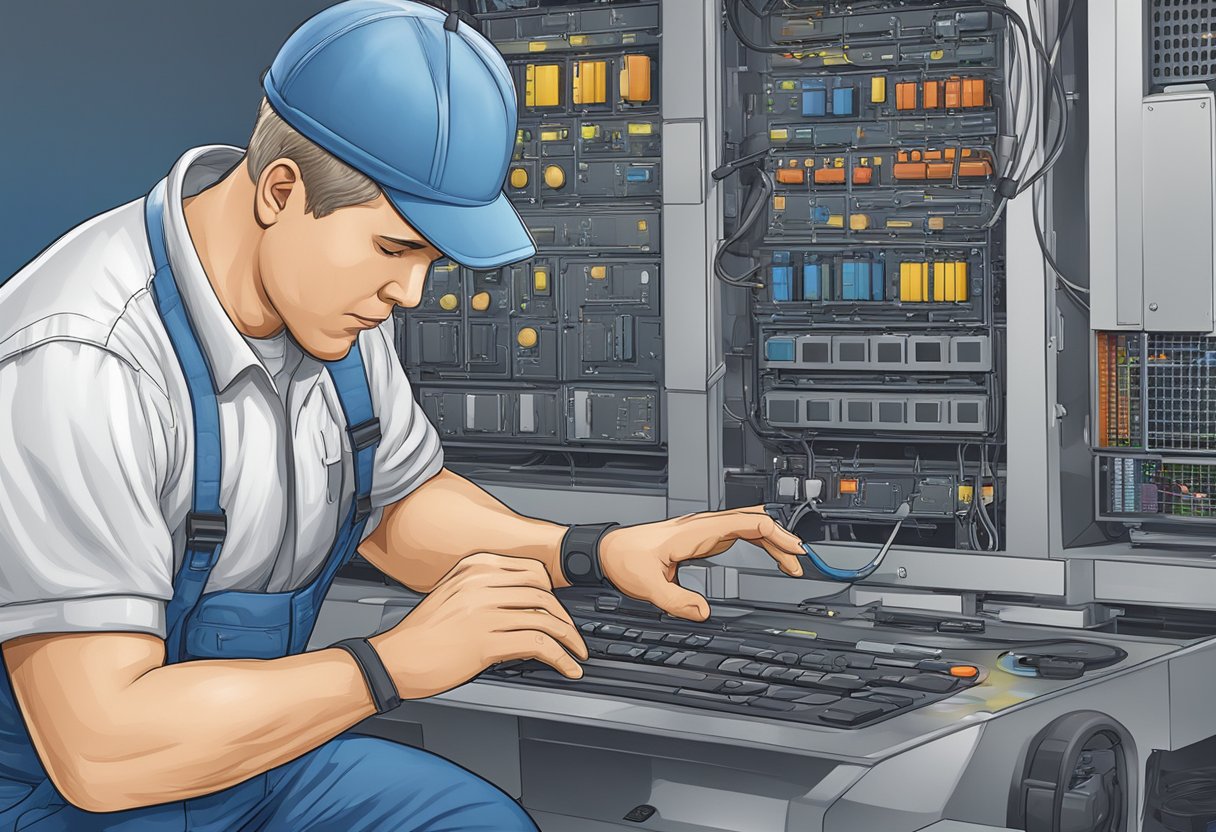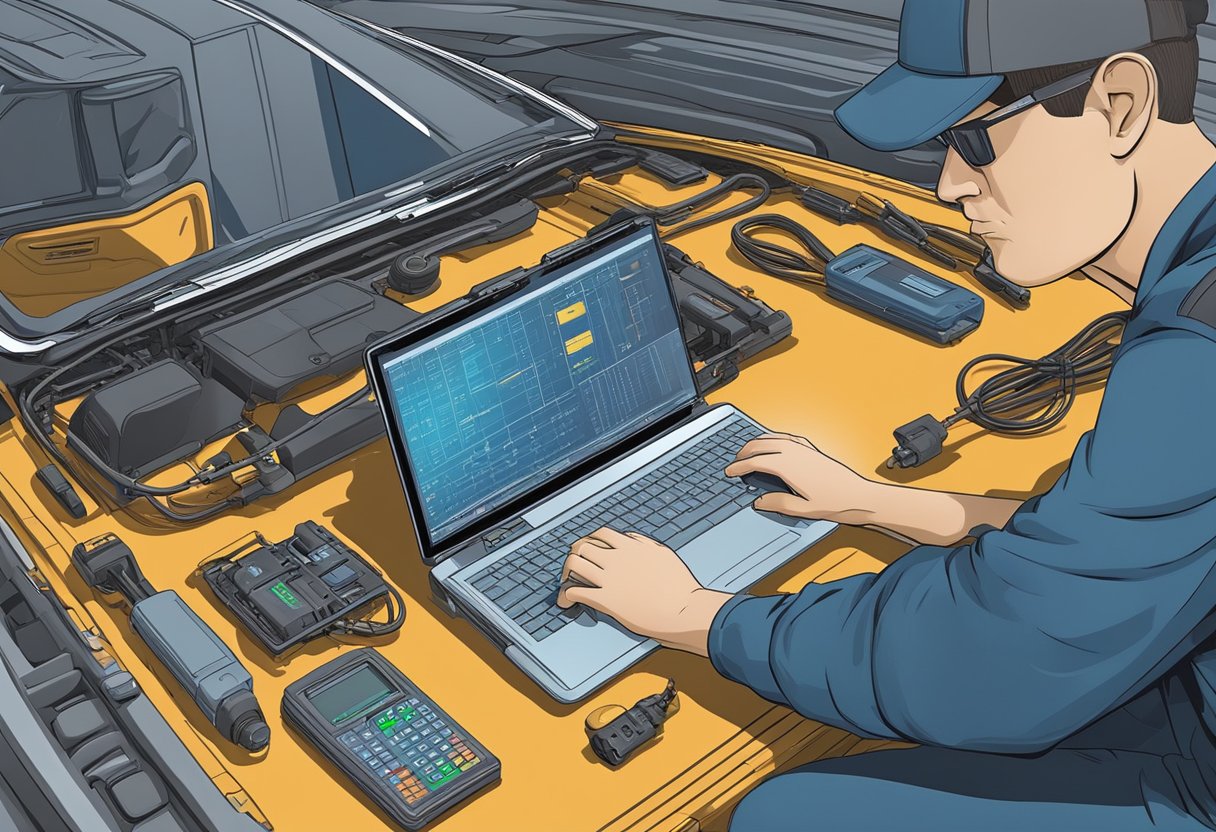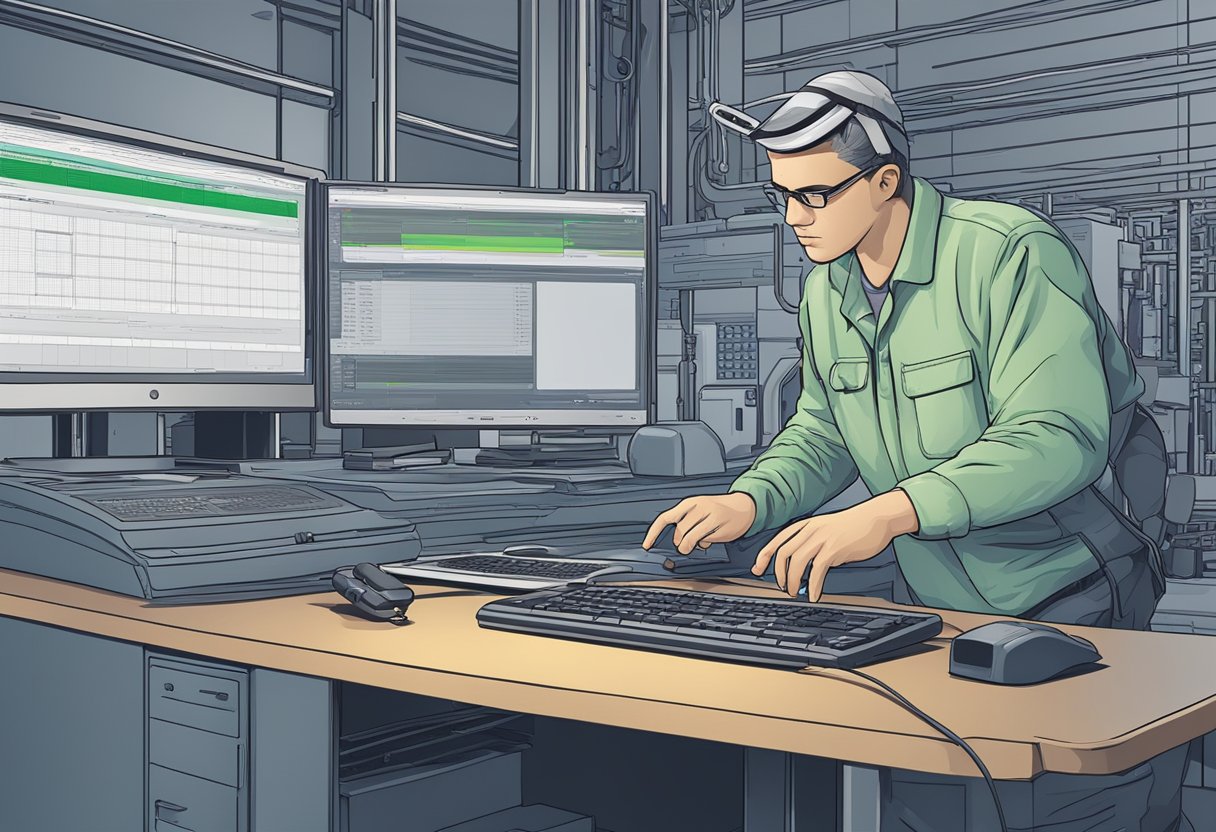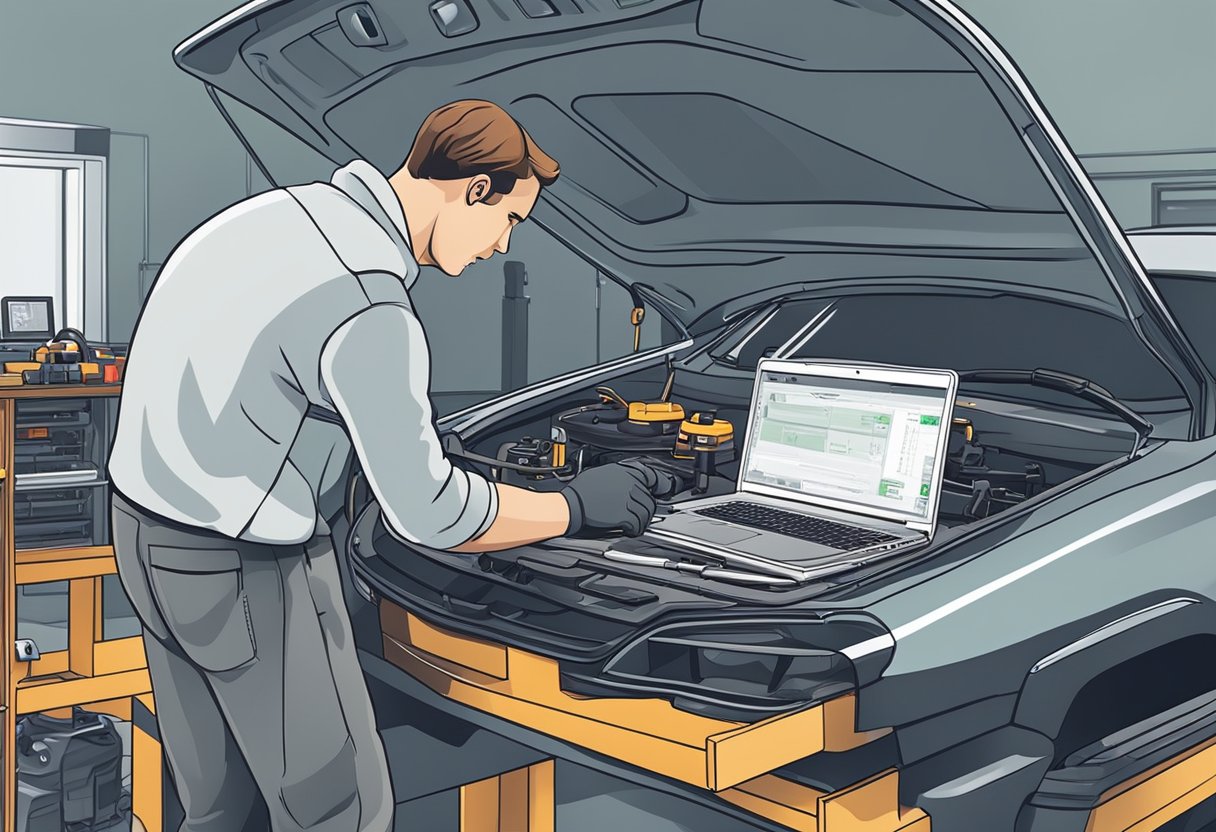If you own a vehicle equipped with an Anti-Lock Brake System (ABS), you may have encountered the U0415 code. This code is triggered when the ABS control module sends out invalid data to one or more modules on the CAN bus.
The U0415 code can be caused by a variety of factors, including damaged wiring, poor connections, a bad ABS control module, or faulty ABS sensors. If you have encountered this code, don’t panic.
In this article, we’ll explore the causes of U0415 and offer solutions to help you fix the issue.
When the Powertrain Control Module (PCM) detects invalid data from the ABS control module, it will set the U0415 code and illuminate a warning light on your dashboard. In most cases, the ABS system will be disabled until the fault is resolved.
If you continue to drive your vehicle with the U0415 code present, you may experience problems with your ABS system, including decreased braking performance and increased stopping distance.
Therefore, it’s essential to diagnose and fix the issue as soon as possible. In the following sections, we’ll provide you with the information you need to solve the U0415 code ABS control data errors.
Understanding the U0415 Code
Definition and Function of ABS
The Anti-Lock Brake System (ABS) is an essential component of the brake system in modern vehicles. The ABS control module is responsible for monitoring the wheel speed sensors and ensuring that the wheels do not lock up during braking.
This prevents skidding and loss of control, improving safety and stability.
What Does U0415 Indicate?
The U0415 code is a diagnostic trouble code (DTC) that indicates an error in the communication between the Powertrain Control Module (PCM) and the ABS control module.
Specifically, it indicates that the PCM has received invalid data from the ABS control module. This can be caused by a variety of factors, including damaged wiring or poor connections, a faulty ABS control module, or faulty ABS sensors.
When the U0415 code is triggered, the ABS warning light will typically illuminate on the dashboard.
In addition, the vehicle may experience a loss of traction control and stability control, as well as a reduction in overall braking performance.
If you suspect that your vehicle is displaying the U0415 code, it is important to have it diagnosed and repaired as soon as possible.
Continuing to drive with this code can lead to further damage to the ABS system and potentially compromise the safety of the vehicle.
Overall, understanding the U0415 code and its implications is crucial for maintaining the safety and reliability of your vehicle’s brake system.
Symptoms and Diagnosis
Common Symptoms of U0415
When the U0415 code appears in your vehicle, it is usually accompanied by a few noticeable symptoms. The most common symptom is the illumination of the engine light on your dashboard.
This light is also known as the service engine soon warning light, and it is the most common way to know that there is something wrong with your vehicle.
Whats more, the ABS warning light might also turn on, indicating that there is a problem with the anti-lock brake system.
Other symptoms of the U0415 code include a decrease in the performance of your vehicle, especially when it comes to braking.
You might notice that your brakes are not as responsive as they used to be, or that they are not working as well as they should.
This is because the error code is related to the ABS control module, which is responsible for managing the anti-lock brake system.
Diagnostic Procedures
If you suspect that your vehicle has the U0415 code, the first step is to diagnose the problem. To do this, you will need to use an OBD-II scanner, which is a tool that can read the error codes that are stored in your vehicle’s computer system.
Once you have the error code, you can begin to diagnose the problem.
The most common cause of the U0415 code is a problem with the ABS control module. This module is responsible for managing the anti-lock brake system, and if it is not working correctly, it can cause the U0415 code to appear.
To diagnose this problem, you will need to check the wiring and connectors that are connected to the ABS control module. If there is a problem with the wiring or connectors, you will need to repair or replace them.
Another possible cause of the U0415 code is a problem with the wheel speed sensors.
These sensors are responsible for measuring the speed of each wheel, which is necessary for the anti-lock brake system to work correctly. If one or more of these sensors are not working correctly, it can cause the U0415 code to appear.
To diagnose this problem, you will need to test the wheel speed sensors for resistance and continuity. You will also need to check the voltage on the power and ground circuits, as well as calculate the current draw from the ABS pump motor.
In conclusion, the U0415 code is a common error code that is related to the ABS control module. If you notice any of the symptoms mentioned above, you should immediately diagnose the problem using an OBD-II scanner.
Once you have identified the problem, you can begin to repair or replace the necessary components to fix the U0415 code and restore your vehicle’s performance.
Troubleshooting and Repair
Step-by-Step Troubleshooting
If you are experiencing the U0415 code, it is important to take immediate action to diagnose and fix the issue. Here are some steps you can take to troubleshoot the problem:
-
Check the wiring and connectors: Make sure all wiring and connectors related to the ABS control module are properly connected and not damaged. Any damaged wiring or connectors should be repaired or replaced.
-
Inspect the harness: Check for any signs of damage or wear on the harness that connects the ABS control module to the vehicle’s main wiring harness. If any damage is found, the harness should be replaced.
-
Scan for other codes: Use an OBD-II scanner to check for any other codes that may be related to the U0415 code. Address any other codes found before proceeding with the U0415 diagnosis.
-
Test the ABS sensors: Use a multimeter to test the resistance of each ABS sensor. If any sensor is found to be faulty, it should be replaced.
-
Inspect the ABS control module: Check the ABS control module for any signs of damage or wear. If any damage is found, the module should be replaced.
Repair and Replacement Options
Once you have identified the cause of the U0415 code, you can take steps to repair or replace the faulty component. Here are some options:
-
Repair the wiring or connectors: If the issue is related to damaged wiring or connectors, you can repair or replace the damaged components.
-
Replace the harness: If the harness is damaged, it should be replaced.
-
Replace the ABS sensors: If any ABS sensors are found to be faulty, they should be replaced.
-
Replace the ABS control module: If the ABS control module is found to be faulty, it should be replaced.
It is important to consult your vehicle’s repair manual for specific instructions on how to properly diagnose and repair the U0415 code. If you are unsure how to proceed, it is recommended that you seek the help of a professional mechanic.
Technical Insights
When it comes to diagnosing and fixing the U0415 code, it’s important to have a solid understanding of the ABS system components and data communication networks involved.
Here are some technical insights that can help you get to the root of the problem.
ABS System Components
The ABS system is made up of several components, including the ABS control module, wheel speed sensors, and hydraulic control unit.
The ABS control module is responsible for monitoring the wheel speed sensor signals and making adjustments to the hydraulic control unit to prevent wheel lockup during braking.
The wheel speed sensors, located at each wheel, send signals to the ABS control module about the rotational speed of the wheels.
Data Communication Networks
The ABS system components communicate with each other and with other systems in the vehicle through a data communication network. The most common network used in modern vehicles is the Controller Area Network (CAN).
The CAN bus is a vehicle bus standard designed to allow microcontrollers and devices to communicate with each other without a host computer.
The Powertrain Control Module (PCM) is the main controller for the engine and transmission systems and is also responsible for monitoring the ABS system through the CAN bus.
When the PCM detects an irregular or erroneous signal from the ABS control module, it triggers the U0415 code. This code can be caused by damaged wiring or poor connections, a bad ABS control module, or faulty wheel speed sensors.
To diagnose the problem, you need to follow some steps to diagnose the trouble code U0415.
It is important to examine all the wiring and connectors, then test the wheel speed sensors for resistance and inspect the freeze frame data for failure. Once the root cause of the problem is identified, it can be fixed and the code cleared.
Preventive Measures and Maintenance
Regular Maintenance Tips
To prevent U0415 code and other ABS issues, it’s essential to maintain your vehicle regularly.
Regular maintenance will help you identify any problems early on, before they become major issues. It will also help you keep your vehicle in good working order, which will reduce the likelihood of ABS issues.
Here are some regular maintenance tips to follow:
- Check your brake fluid regularly: The brake fluid is the lifeblood of your brake system. Check it regularly to ensure it’s at the right level and is clean. Dirty or low brake fluid can cause ABS issues.
- Replace brake pads and rotors: Worn brake pads and rotors can cause ABS issues. Replace them as recommended by your vehicle manufacturer to keep your brake system in good working order.
- Check your ABS sensors: The ABS sensors are responsible for detecting wheel speed. If they’re dirty or damaged, they can cause ABS issues. Clean or replace them as necessary.
- Inspect your brake lines: Check your brake lines for leaks, cracks, or other damage. Damaged brake lines can cause ABS issues.
Avoiding Common ABS Issues
In addition to regular maintenance, there are some preventive measures you can take to avoid common ABS issues. Here are some tips:
- Drive carefully: Avoid sudden stops and hard braking, which can cause ABS issues.
- Avoid driving through deep water: Driving through deep water can damage your ABS sensors and cause ABS issues.
- Avoid overloading your vehicle: Overloading your vehicle can cause your brakes to overheat, which can cause ABS issues.
- Avoid driving with a faulty ABS control module: If your ABS control module is faulty, it can cause ABS issues. Replace it as soon as possible.
By following these tips, you can reduce the likelihood of ABS issues, including the U0415 code. Regular maintenance and preventive measures are essential for keeping your vehicle in good working order and avoiding costly repairs.
As an Amazon Associate we earn from qualifying purchases.















